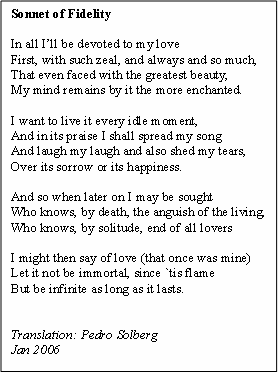Vinicius de Moraes: O Grande Encontro (2)

O Grande Encontro de
Vinicius de Moraes – Toquinho – Maria Creusa
Recorded probably 1972.Released in France 1975, Brazil1988.
Available at the Toca de Vinicius (Rua Vinicius de Moraes 129, Ipanema)
In 1958, the songwriting partnership between Antonio Carlos Jobim and Vinicius de Moraes was in full flower. Elizete Cardoso’s LP Canção de amor demais had 12 of their songs, including Chega de saudade, whose highly original rhythmic beat from João Gilberto on the guitar sparked the revolution in Brazilian popular music which came to be called Bossa Nova. During the years from 1958 to 1965, Vinicius became a major figure in this movement – 50 songs with Tom Jobim, 40 with Baden Powell, 30 with Carlos Lyra, 20 with Edu Lobo, as well as occasional partnerships with Pixinguinha, Ary Barroso and others. Vinicius’s words somehow manage to capture the spirit of the music – perhaps lyrical, or ironic, or virile – and fit perfectly with the rhythm, while they are often beautiful meaningful poems in their own right. Little wonder that Vinicius became the guru of the movement. In the film Vinicius (still running in Rio!) there are some film clips from that time, showing Vinicius (at 45) among the crowd of young musicians who gathered in friends’ apartments (often Nara Leon’s) in Copacabana or Ipanema. At a time when the popular song usually treated the loved one as an unattainable ideal – a femme fatale – with Vinicius she became the Girl from Ipanema – captivating, an object of affectionate admiration and devotion, but without the desperate remoteness.
The later years
This no doubt was in keeping with the spirit of the times, when the conventional morality among the middle classes began to break down, (as happened in the US and Europe  too).In 1958, Vinicius had married again, with Maria Lúcia (Lucinha) Proença, and in 1962 came some of his most famous works – the book of short stories and poems Para viver um grande amor, the song Garota de Ipanema (with Tom Jobim) and his first show – in the boate Bom Gourmet, with Tom Jobim and João Gilberto. Garota de Ipanema was to become the emblem of Bossa Nova, and its success in the US, in a recording with Stan Getz, made Bossa Nova known internationally.
too).In 1958, Vinicius had married again, with Maria Lúcia (Lucinha) Proença, and in 1962 came some of his most famous works – the book of short stories and poems Para viver um grande amor, the song Garota de Ipanema (with Tom Jobim) and his first show – in the boate Bom Gourmet, with Tom Jobim and João Gilberto. Garota de Ipanema was to become the emblem of Bossa Nova, and its success in the US, in a recording with Stan Getz, made Bossa Nova known internationally.
In 1963, Vinicius was with a new girlfriend Nelita Abreu Rocha, who eloped in secret with Vinicius to Paris, in the best romantic tradition. This diplomatic posting ended in 1964, and Vinicius returned to Rio, where he continued with a huge artistic output, writing songs, doing shows, collaborating in films, and publishing books of stories and of poems. In 1969 he was awarded compulsory retirement from the Diplomatic service, by Brazil’s then Military Government. After Nelita left him (resenting the unequal competition with doses of whisky), he again changed partners, to Cristina Gurjão.
In 1969 began Vinicius’s partnership with guitarist Toquinho, which lasted until Vinicius’s death in 1980. This memorable association produced over 100 compositions, and hundreds of shows in many countries. I well remember a show at the Teatro Leblon in the 70s with Vinicius, Toquinho and Clara Nunes: Toquinho’s competence and tremendous facility on the guitar, my astonishment at Vinicius’s entry being preceded by a bottle of whisky, which was then served with ice, on the stage, in repeated doses; Vinicius’s puckish good humour; the way Clara Nunes sparkled at his appreciation; the way the audience loved everything.
In 1970 Vinicius fell for the baiana Gesse Gessy, went to live in Bahia, and married her in the rites of condomblé. There he lived as “the oldest hippy in Brazil” before being rescued by Toquinho and taken to Italy, touring afterwards in Portugal, Uruguai, Argentina. In 1975 a new partner came on the scene, Marta Santamaria. In 1977 there came the renewal of the association with Tom Jobim, in a show with Toquinho and Miúcha, which filled the Canecão for seven straight months. And in 1978 he married Gilda Mattoso….
The CD (Part 2)
To continue with our appreciation of the CD – Minha Namorada is another classic of MPB – this time Vinicius’ words have music by Carlos Lyra. In the first part Maria Creusa sings of how a “namorada” should be – “….just mine / who no-one else can have“, and then Vinicius sings of the stage beyond, the “amada” – “…You must come with me on my journey / and perhaps my pathway will bring you sadness……your eyes should be just for my eyes / your arms my refuge / in the silence of thereafter“, with a very sensitive accompaniment from Toquinho on the guitar.
The next track Testamento has a very strong rhythmic impulse – it really swings! The words by Vinicius make fun of conventional goals in life – “You who just earn to save up / tell me what’s the good of that / you’ll see one day / in what a mess you’ll be // Up above a tombstone / down below the darkness / it’s no fun, my friend / no fun at all” “How good it is to stop / and see the sunset or watch the sunrise / and switch off, switch off“. The way the words “Por cima uma laje / Embaixo a escuridão” are scanned across the rhythm is a real lesson….
Regra Três, A Tonga da Mironga do Kabuletê and Que Maravilha are all cheerful up-tempo tracks, while No Colo da Serra (Se eu tiver que morrer / Vou morrer pela vida!) and Você Abusou (with a great cuica in the rhythm section) are more contemplative. In all, a fine CD, both for the words and the music.
Retrospect
Reading the chronicle of Vinicius’s life, one might regret an apparent fall from grace. But the key is that Vinicius really lived his own philosophy, as expressed in the poem Sonnet to Fidelity (in the box). He was addicted to being passionately in love – that state of inebriation when one’s senses are dominated by the need for the loved one, when artistic creativity flowers, and the world attains a particular beauty and sparkle. But in this, if he was uninterested in the more worldly marks of prestige, his gentle, humorous affection enchanted those round him. Listen to his last wife Gilda, writing to him on what would have been his 90th birthday: “You left in each of us, who had the privilege of your company, a legacy of affection, friendship and love which made us better than we were before we knew you. Few people have had such a perfect notion of loving one’s neighbour as you, and every time I look again at your vast musical and poetic output, I think how we feel your absence….”
Saravá, Vinicius!
Permalink Comments off